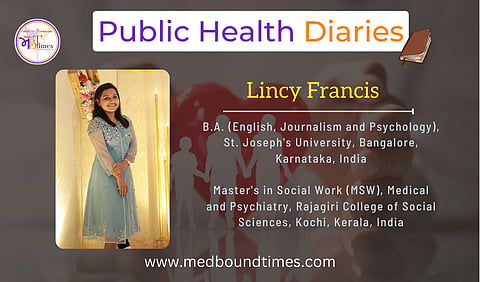Public Health Diaries - Lincy Francis
Name: Lincy Francis
Educational Qualification: B.A. (English, Journalism and Psychology) , St. Joseph's University, Bangalore, Karnataka, India
Master's in Social Work (MSW) Medical and Psychiatry from Rajagiri College of Social Sciences, Kochi, Kerala, India
Current Position:
I am a Clinical Counsellor.
Where are you working currently?
I am currently working at Family Services Thames Valley, Toronto, Canada.
What are your areas of interest within your profession?
Mental health is my primary area of interest, and I am truly passionate about the work I do in this field.
What made you choose public health research as a profession?
I chose this field because it has the power to create a tangible impact on society, particularly through policy formation that supports underprivileged communities.
Any 3 topics/subjects that you like the most
Mental Health and Community Well-being
Health Equity
Chronic Disease Prevention
Any 3 topics/subjects that you dislike/ detest the most:
Data-driven Public Health Tools
Health Communication
Misinformation about Climate Change and Environmental Health
What are your career goals or expectations?
My goal is to expand research on mental health and break the stereotypes associated with it. I also aim to foster a social change where mental health services are accessible to everyone.
What would you be doing if not for the current profession?
I would have chosen to be a professor.
What do you like to do in your leisure time?
I like to read and listen to music in my leisure time.
Who do you idolize and why?
Mother Teresa, because she showed the real meaning of service.
What is nutritional deficiency?
Nutritional deficiency occurs when the body lacks essential nutrients required for optimal functioning.
How one can know he/she is nutritional deficient? Are there any specific tests to check?
Blood work can indicate if there is nutritional deficiency.
How can one overcome this?
To overcome nutritional deficiency, one should make lifestyle changes, eat a healthy diet, and take supplements if needed.
How can you prevent yourself from nutrition deficiency in the first place? Do you need supplementation or simple home meal is sufficient?
A nutritious, well-balanced home-cooked meal is often sufficient. However, I do take supplements when necessary to fill any gaps.
What are some of the topics in public health and nutrition topics about which you are most Passionate about?
I’m passionate about lifestyle diseases and their prevention, especially in the context of public health and nutrition.
Please provide us with advice on how to eat healthy and balanced meals on a tight schedule.
I would recommend eating meals on time and eating enough. Also, include protein and fibre in your food and exercise regularly.
In which areas of public health and Nutrition do you have the most expertise? If you can tell us about it briefly.
I have expertise in lifestyle diseases and how they impact mental health. I did a study during my master’s program which showed that people with chronic illnesses like blood pressure and diabetes are more prone to depression and anxiety.
How do you feel about the fact that people nowadays are less inclined to eating their traditional Indian dishes and more inclined to eat junk food?
I definitely feel that eating a lot of junk food has created many health issues in people these days.
Please list some readable websites or publications or anything that you use to keep up with the most recent research in your profession.
I primarily use PubMed to stay updated with the latest research.
What change would you like to bring about in the Health or Nutrition sector?
I would like to increase awareness around lifestyle diseases and focus on preventive healthcare.
And finally, what message would you like to give to today's youth?
I would tell today's generation that Health is wealth.


